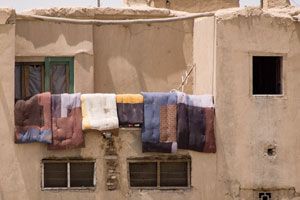
Stories Over Tea
We sat in a mud-walled room, though I would not have known it from the inside. Smoothly plastered and painted walls held paintings, interrupted only by windows across the front of the room. Beautifully woven carpets spread out from underneath thin, cotton-stuffed mattresses where we sat crossed legged. Though it was at least 105 degrees outside, we started as we always do- with several cups of steaming hot tea, served with candies and locally baked sugar cookies. We talked briefly about our families, and then jumped right in to stories.
I asked my friend how his storytelling had gone since we had met the previous week. He told me he had shared the story we had discussed together with some close family members. Because it was culturally appropriate to offer tea to customers in his part of the world, my friend had also shared the story with some visitors who had stopped by his shop. Their acceptance of my friend’s polite gesture provided a unique opportunity for him to naturally pass on a story in the course of conversation during their visit. I was amazed at my friend’s boldness; but I advised him to be careful. He told me, “I am only telling a story; there is no harm in that.”
Discovering the Power of a Story

What a simple, yet brilliant, way to share the Scriptures! As we read the Gospel accounts, we see Jesus telling story after story. He told proverbs and stories from the Old Testament, and he told new stories that challenged and excited the people around him. As followers of Jesus, we have the joy and honor of passing along these same stories to people who have never had the opportunity to hear the Good News.
I wasn’t always this excited about telling stories. When I first came to the mission field, I felt I had to pass along all my seminary training in order to be effective. I would pull my books out and try to explain big theological terms in simple language that could be understood; and frankly, it did not work. I ran into deep frustration, both on my part and on the part of the people I was trying to teach! It was later, during a home service in the U.S., that I was first introduced to the idea of sharing the Gospel the way Jesus did 2000 years ago- through stories.
Upon returning to the field, I tried putting what I had learned into practice. I was amazed at the immediate difference I saw in impact , compared to my previous methods of teaching systematic theology to a class of one! I found stories to be much easier to remember and pass along to others. In a country with low literacy rates, high security, and an occasional frisking of the local population by police or soldiers- storytelling was proving to be a great way to pass along the Gospel, without worrying about someone getting caught with a Bible.
A Lasting Legacy
Our routine, each time my friend and I met, was to drink tea and then talk about how his storytelling went since the previous meeting. Then, we would pray for the people with whom he had shared. Next, we would start learning a new story. I would tell it, and he would repeat it back to me. He was always much better and quicker than me at learning new stories! As he began sharing these Bible stories, his wife and children were led to the Lord. After much prayer, he also began sharing them with his brother and another close friend. His friend liked the stories, but was scared to accept their teachings. However, his brother was soon compelled to follow Jesus and also began sharing the stories with others. Soon, both brothers were leading their own story groups each week.
Because he had been sharing so openly, my friend's younger brother was eventually forced leave the country. However, my friend remains there to this day- faithfully sharing Bible stories with family, friends, and customers. When civil unrest required our family to leave that part of the country, it was God’s Word- forever imprinted in the form of these stories in our friends’ memories, that carried them through some very dark days, months, and even years ahead. My experience in all those first meetings over tea with my friend has taught me that God’s Word, shared through stories, has the power to infiltrate and endure in even the toughest and most closed places- leaving a legacy that will endure long after we are gone.

Additional Posts




